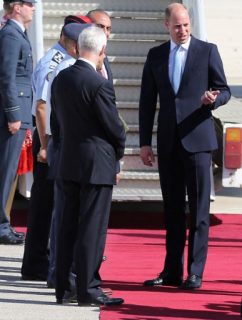
by Mussa Hattar
Agence France-Presse
AMMAN, Jordan (AFP) – Prince William flew in to Jordan on Sunday at the launch of a Middle East tour that will see him become the first British royal to pay official visits to both Israel and the Palestinian territories.
He was greeted at Amman’s Marka military airport by Crown Prince Hussein bin Abdullah, hosting William for the two-day visit in Jordan.
The 36-year-old Duke of Cambridge’s Royal Air Force plane touched down at the small airport in eastern Amman, where he was given a red-carpet welcome by the heir to the Jordanian throne.
Royal guards carrying rifles fitted with bayonets and wearing Jordan’s traditional red-and-white chequered keffiyeh scarves stood to attention as the prince, in a dark suit, descended from the plane.
The visit by the second in line to the British throne has been billed as a chance to bond with 23-year-old Prince Hussein, a fellow graduate of Britain’s Royal Sandhurst Military Academy.
On Sunday evening, William attended a birthday party in honour of his grandmother, Queen Elizabeth II, whose official 92nd birthday was celebrated on June 9, at the British ambassador’s residence.
“I greatly admire the resilience you in Jordan have shown in the face of the many security and humanitarian challenges that have confronted you as a result of conflicts in this region,” William said at the party.
“The way in which you opened your doors to hundreds of thousands of refugees from Syria, not to mention your longstanding commitments to Palestinian refugees, is remarkable,” he said.
“In so many ways, Jordan as an open and stable society is a beacon of hope for many other people in the Middle East.”
On Monday, William will visit the ancient Roman ruins of Jerash, north of the capital, as well as a vocational training college for young Jordanians and Syrian refugees.
That evening, he will begin his history-making visit to the Jewish state and occupied West Bank during which he will meet both Israel’s Prime Minister Benjamin Netanyahu and Palestinian president Mahmud Abbas.
Seeds of conflict
Kensington Palace has underlined the “non-political nature of His Royal Highness’s role — in common with all royal visits overseas”.
But the region is a minefield of sensitivities.
The visit comes at a particularly volatile time after US President Donald Trump recognised Jerusalem as capital of Israel and moved Washington’s embassy there, sparking Arab outrage and deadly clashes.
Britain governed the region under a League of Nations mandate for almost three decades until Israel’s independence 70 years ago, and is still blamed by both sides for sowing the seeds of a conflict that continues to wrack the region.
Ahead of William’s arrival, the official schedule’s reference to east Jerusalem as “in the Occupied Palestinian Territories” sparked anger among right-wing Israeli politicians.
Official visits by British royals take place at the request of the UK government, but statements from the prince’s household have given little explanation for the timing of this trip.
Israel has long pushed for an official visit by a member of the British monarchy.
Other members of William’s family — including his father Prince Charles — have made unofficial visits to Israel and east Jerusalem in the past.
During the trip, William will have plenty of reminders of Britain’s role in the region.
In Jerusalem, he will stay at the King David hotel, which was Britain’s administrative headquarters during its rule of Palestine prior to Israeli statehood in 1948.
In 1946, militant Jews waging violent resistance against British rule bombed the building, killing and wounding scores of people, many of them British civil servants or military personnel.
Whilst in Jerusalem, William will lay a wreath at the Yad Vashem Holocaust Memorial.
He will also visit the Mount of Olives in Jerusalem and pay tribute at the tomb of his great-grandmother, Princess Alice of Greece, who has been honoured by Israel for sheltering Jews during World War II.
In the West Bank city of Ramallah, he is to hold talks with Abbas and also meet Palestinian refugees and young people.







